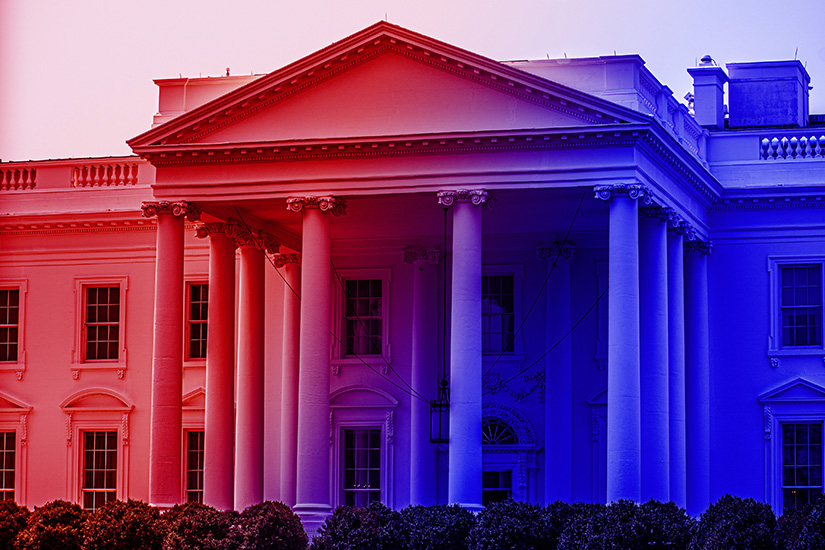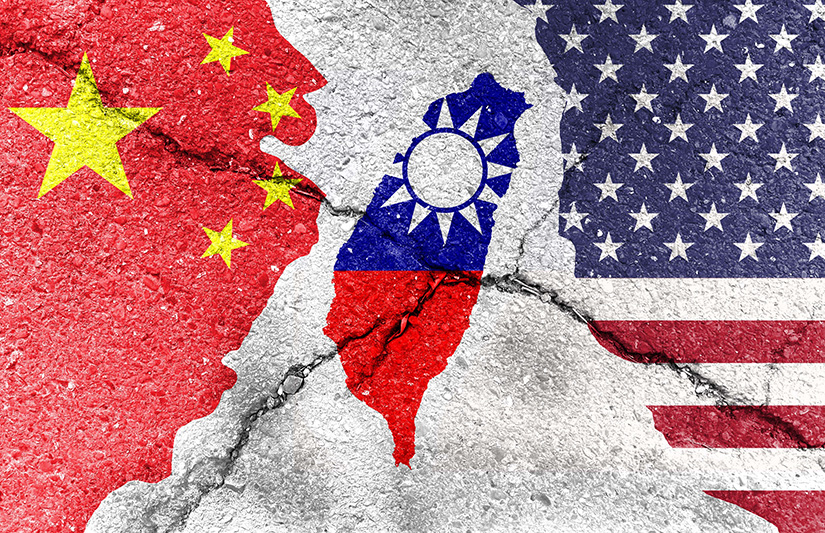Introduction
As armed conflicts continue worldwide, debates within the U.S. over foreign policy, particularly regarding the prioritization and allocation of resources for dealing with China, have become more pronounced.
The Biden administration has argued that China is closely watching the developments in the Ukraine war with the intent of unifying Taiwan by force. Therefore, it argues that a strong response to the Ukraine war is necessary to avoid sending the wrong signals to China. On the other hand, the Trump camp has expressed skepticism about U.S. support for Ukraine, advocating for a more prominent role for European allies, while focusing more on rivalry and competition with China.
However, even within the Trump camp, there appears to be no unanimous agreement on which aspects of the rivalry with China should be prioritized.[2] Therefore, this article examines the differences in policy discussions and arguments about China, particularly between a rising faction known as the “Prioritizers,” and Trump himself.[3]

What Do the Prioritizers Argue?
The Prioritizers argue that the U.S. should prioritize Asia and China over Europe and the Middle East, focusing on the military aspect of U.S.-China competition. Many of them express skepticism about U.S. support for Ukraine, criticizing how involvement in other theaters is weakening the U.S. ability to deter a Chinese invasion of Taiwan. By urging European allies to take on more prominent roles, they argue that the U.S. could shift its resources toward Asia and China. The Prioritizers include figures like Senators J.D. Vance and Josh Hawley,[4] as well as policy advisors such as former Deputy Assistant Secretary of Defense Elbridge Colby and Alex Velez-Green of the Heritage Foundation.[5]
For instance, Vance, who was nominated as the vice presidential candidate, stated, “We do not have the industrial capacity to support a war in Ukraine, a war in Israel, [and] potentially a war in East Asia if the Chinese invade Taiwan, so America has to pick and choose.” He highlights the limits of U.S. industrial capacity and insists on narrowing the focus of U.S. foreign policy. He contrasts two options: “Is China going to be more dissuaded by us thumping our chests and acting tough in Europe, or are they going to be more dissuaded by us having the weapons necessary to prevent them from invading Taiwan?” He argues that the latter—the actual U.S. strength—is what matters. Furthermore, he suggests that “if the Europeans are willing to step up and take more responsibility for their own defense, they can handle Putin, let [the U.S.] focus on China.”[6]
Similarly, Colby, seen as a leading figure among the Prioritizers, criticizes the U.S. for “focusing way too much on Ukraine” and asserts that “China’s main calculation is going to be the balance of military forces vis-à-vis Taiwan, and how resolute the American government and the American people are vis-à-vis this specific conflict [over Taiwan].”[7] Regarding security in Europe, he advocates for “put[ting] a lot more pressure and encouragement on Europe to step up and take the primary role,”[8] arguing that the U.S. must “prioritize China over Europe.”[9]
While the Prioritizers broadly agree that China should be the priority given the U.S.’ limited resources, there are slight differences in how much emphasis they place on the military aspect. Colby, for example, places a strong emphasis on military confrontation with China, arguing that “preventing China from establishing this hegemony over Asia must be the priority of U.S. foreign policy,”[10] and that “a war with China is very possible…To avoid it, we should focus our own military resources on Asia.”[11] In contrast, other Prioritizers, such as Vance, focus on the economic and social impact of China as well, particularly its effects on U.S. manufacturing and middle-class jobs through low-priced Chinese products and foreign labor.[12]

Trump’s Stance
Trump himself has raised doubts about U.S. involvement in Europe, demanding that European allies shoulder more of the burden. Unlike the Prioritizers, however, he has not clearly advocated for redirecting U.S. resources toward a potential military confrontation with China. Instead, he tends to focus on the economic and social dimensions of the conflict with China, treating China more as a domestic issue. For example, in his policy agenda “Agenda 47” and the “2024 Republican Party Platform,” as well as in speeches across various states and interviews, Trump consistently emphasizes “protect[ing] American workers and farmers from unfair trade” with China and “reclaim[ing] our economic independence from China.”[13]
Moreover, Trump’s views on the military dimension of the rivalry with China, particularly regarding Taiwan, remain vague and limited.[14] Right after Russia’s invasion of Ukraine, he warned that “Taiwan is going to be next.”[15] However, he later moderated his tone, suggesting that China could bombard Taiwan, but “they don’t want to do that because they don’t want to lose all those chip plants.” This indicates a more restrained assessment of China’s intentions concerning the unification of Taiwan by force.[16]
Regarding U.S. military involvement in a Taiwan contingency, Trump has deliberately maintained ambiguity. President Biden has emphasized maintaining the One China policy, making it clear that “it does not mean that China has the jurisdiction to go in and use force to take over Taiwan”[17] and the U.S. has “not ruling out using US military force.”[18] On the other hand, Trump has avoided making similar comments. When asked whether the U.S. would intervene militarily, Trump responded, “if I’m in the position of President, I don’t want to say what I’m thinking. If I answer that question, it would put me in a very bad negotiating position.”[19] He has refused to clarify his stance, saying, “I would never say that because you give away all your options.”[20]
Furthermore, Trump’s sense of ‘unfairness’ extends not only to China but also to U.S. allies and partners, including Taiwan. Trump has expressed dissatisfaction with Taiwan’s defense contributions, stating that “Taiwan should pay us for defense. You know, we’re no different than an insurance company. Taiwan doesn’t give us anything,” while highlighting Taiwan’s economic prosperity.[21] He also criticized the economic unfairness, claiming that “they took almost 100% of our chip industry,”[22] and argued that “Taiwan took our business away. We should’ve stopped them. We should’ve taxed them. We should’ve tariffed them.”[23]

Commonalities and Differences between the Prioritizers and Trump
As shown, both the Prioritizers and Trump share skepticism regarding U.S. involvement in Europe, demanding that European allies take on greater roles. The nomination of J.D. Vance as the vice-presidential candidate suggests that the Prioritizers’ stance and Trump’ sense of unfairness may resonate and the U.S. involvement in Europe may decline.
However, there are differences in their positions on the military aspects of rivalry with China. The Prioritizers argue that U.S. resources currently allocated to Europe and the Middle East should be redirected to Asia to strengthen the U.S. defense posture in the region out of consideration for a potential military conflict with China, particularly an invasion of Taiwan. In contrast, Trump tends to treat China as a domestic issue, focusing on the economic and social aspects of the competition. His statements regarding China’s military intentions and U.S. military involvement have been ambiguous and restrained.
Additionally, while both the Prioritizers and Trump call for U.S. allies in Asia to bolster their defense efforts, the underlying motivations differ. For instance, Colby strongly advocates for increased defense spending by Japan and Taiwan, but this is not driven by a sense of unfairness like Trump’s stance. Instead, Colby seeks to encourage the necessary efforts to deter the “acute, lethal and imminent” threat posed by China.[24]
How these differing views on military conflict with China, as well as their approaches toward allies and partners, will be reconciled remains to be seen. Close attention should be paid to personnel appointments within the Trump camp.
Conclusion
The success of the Trump camp’s foreign and China policies will hinge on how effectively it can share or shift the burden of maintaining global peace with allies. However, if a potential Trump administration pressures European allies to take on more of the burden by invoking a sense of unfairness, it risks creating unnecessary tensions with Europe, especially amid an ongoing war with a nuclear-armed Russia. If allies in other regions interpret this as wavering U.S. commitment to alliances, U.S. influence and the strength of its alliance network could ironically erode over the long term.
Moreover, if Trump is re-elected and adopts the Prioritizers’ agenda, with a focus on Asia and China, it may initially seem to be to the benefit of U.S. allies in Asia facing China. However, prioritizing Asia does not mean that the U.S. will not seek to share burdens and responsibilities with those allies. Rather, combined with Trump’s sense of unfairness, the expectation that allies should take primary responsibility for their own security as partners to address the top-priority issue, as Colby and Velez-Green have argued, will likely be further emphasized.[25]
The debates in the U.S. over whether to prioritize Asia and China, and whether the U.S. should demonstrate its willingness to engage globally or focus on strengthening its defense posture in Asia to deter China, will shape not only U.S. policy toward China but also the future of U.S. leadership in the international arena.
Amid ongoing global conflicts, as the U.S. questions its own capacity, it is seeking not only followership from its allies to play a complementary role but also a more active role in maintaining and advancing regional order. The ownership of regional security by U.S. allies is now being tested.
(2024/11/6)
Notes
- * Originally published in Japanese as Riho Aizawa, “Trump Seiken 2.0 no Gaiko Anzen Hosho Seisaku wo Kangaeru: ‘Prioritizer’ ha no Taito? [Trump 2.0 Administration’s Diplomatic and Security Policies: The Rise of the ‘Prioritizers’?],” IINA, Sasakawa Peace Foundation (October 23, 2024).
- 2 Regarding the differences between the Trump camp and the Prioritizers on China policy, the following paper also points this out; Alex J. Rouhandeh, “Meet the Republican Millennials Warring for Trump’s Mind,” Newsweek, July 17, 2024; Alex Velez-Green, “The Rise of Republican National Security Prioritizers,” The Heritage Foundation, September 28, 2023; Peter Rough, “Gradually, Then Suddenly,” Konrad-Adenauer-Stiftung, April 2, 2024; Majda Ruge, “China, Trade, and Security: What a Trump-Vance Administration Would Mean for Europe,” European Council on Foreign Relations, July 19, 2024.
- 3 Majda Ruge and Jeremy Shapiro, “Polarised Power: The Three Republican ‘Tribes’ That Could Define America’s Relationship with the World,” European Council on Foreign Relations, November 17, 2022; Rouhandeh, “Meet the Republican Millennials Warring for Trump's Mind."
- 4 Josh Hawley, “China and Ukraine: A Time for Truth,” The Heritage Foundation, February 16, 2023; Josh Hawley, Letter to Secretary of Defense Lloyd Austin, July 10, 2024; The following Republican lawmakers are also considered part of the Prioritizers: Jim Banks (Indiana), Cory Mills (Florida), Eli Crane (Arizona), Wesley Hunt (Texas), Derrick Van Orden (Wisconsin), Anna Paulina Luna (Florida), Eric Schmitt (Missouri), Roger Marshall (Kansas), Katie Britt (Alabama), Tom Cotton (Arkansas), Markwayne Mullin (Oklahoma). Ian Ward, “The Republican Ukraine Skeptics Who Saw War Firsthand,” POLITICO, July 4, 2024; Rouhandeh, “Meet the Republican Millennials Warring for Trump’s Mind.”
- 5 Freddie Sayers, “Elbridge Colby: China Is More Dangerous than Russia Donald Trump’s Foreign Policy Advisor Warns of a New Cold War,” UnHerd, April 1, 2023; Alex Velez-Green and Robert Peters, “The Prioritization Imperative: A Strategy to Defend America’s Interests in a More Dangerous World,” The Heritage Foundation, August 1, 2024.
- 6 J.D. Vance, “Senator Vance: Europe Has to Step Up, America Needs to Focus on China,” Office of Senator JD Vance, April 28, 2024.
- 7 Sayers, “Elbridge Colby.”
- 8 Ibid.
- 9 Elbridge Colby, “America Must Face Reality and Prioritize China over Europe,” Financial Times, May 23, 2024.
- 10 Elbridge Colby, “China, Not Russia, Still Poses the Greatest Challenge to U.S. Security,” The National Interest, July 1, 2022.
- 11 For instance, Elbridge Colby (@ElbridgeColby), “A war with China is very possible, God forbid. Taiwan would be its likely focal point. To avoid it, we should focus our own military resources on Asia and strongly press Taiwan to increase defense spending…,” X, August 21, 2024, 9:38 p.m.
- 12 Lin Yang, “Vice Presidential Nominee Vance Calls China ‘Biggest Threat to Our Country,’” Voice of America, July 16, 2024; J.D. Vance, “Address Accepting the Vice Presidential Nomination at the Republican National Convention in Milwaukee, Wisconsin,” The American Presidency Project, July 17, 2024.
- 13 “Agenda47: President Trump’s New Trade Plan to Protect American Workers,” February 27, 2023; “2024 GOP Platform: Make America Great Again!” July 8, 2024.
- 14 For other major analyses presenting similar discussions, see the following; Ben Scott, “Don’t Expect Trump 2.0 to Be So Tough on China,” Lowy Institute, July 24, 2024.
- 15 Stephanie Giang-Paunon, “As Russia-Ukraine War Rages, Trump Says ‘Taiwan is Next’ for a Potential Invasion,” Fox Business, March 2, 2022.
- 16 “The Donald Trump Interview Transcript,” Bloomberg Businessweek, July 16, 2024.
- 17 “Remarks by President Biden and Prime Minister Kishida Fumio of Japan in Joint Press Conference,” The White House, May 23, 2022.
- 18 “Read the Full Transcript of President Joe Biden’s Interview with TIME,” TIME, June 4, 2024.
- 19 “Trump Says Taiwan 'Took Our Business Away,’” MSNBC, July 17, 2023.
- 20 “Trump ‘Won’t Say’ If He Would Provide Military Support to Taiwan against an Invasion from China,” NBC News, September 17, 2023; During Trump’s presidency, there was also some confusion regarding the One China policy.
- 21 “Businessweek The Donald Trump Interview Transcript,” Bloomberg, June 16, 2024.
- 22 Ibid.
- 23 “Trump Says Taiwan ‘Took Our Business Away,’” MSNBC at YouTube video, July 17, 2023.
- 24 Ken Moriyasu, “Japan Should Triple Defense Budget ‘Immediately’: Elbridge Colby,” Nikkei Asia, August 4, 2022.; Elbridge Colby, "Taiwan Must Get Serious on Defense.” Taipei Times, May 11, 2024.
- 25 Velez-Green and Peters, “The Prioritization Imperative”; Moriyasu, “Japan Should Triple Defense Budget ‘Immediately’”; Elbridge Colby, "Taiwan Must Get Serious on Defense.”

